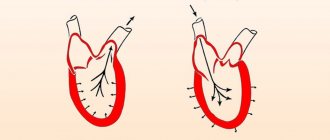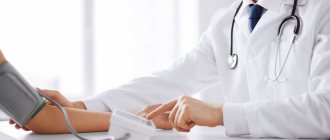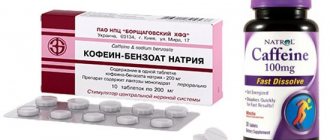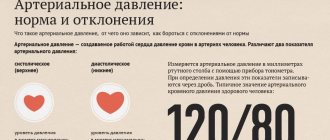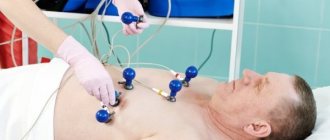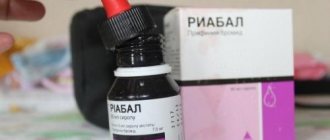Physiological reasons
Why does blood pressure rise? There is no clear answer to this question. But we can say for sure that hypertension can be primary (essential) and secondary. Sometimes it is difficult to distinguish between these two subtypes; this requires a full diagnostic examination.
Primary hypertension is an increase in pressure that is associated with a pathological condition of the vascular system. It is provoked by certain factors or a combination of them. But they can only increase the likelihood of developing the disease, but do not cause it directly. This
- aging of the body;
- presence of the disease in close relatives;
- completeness;
- physical inactivity;
- poor nutrition;
- abuse of tobacco products and alcoholic beverages;
- taking certain medications and dietary supplements;
- bad ecology;
- excessive physical activity;
- weather.
Blood pressure can rise as the body ages. Age-related changes in blood vessels include thickening of their walls, loss of elasticity, and narrowing of the lumen between the walls. For the same reason, blood vessels can become thin and brittle. Calcium salts and lipids accumulate inside them, the muscle layer atrophies, and collagen production decreases.
Hereditary predisposition is a common cause of persistent high blood pressure.
Many hypertensive patients have close relatives with similar problems. But the disease occurs only with a combination of other harmful factors. If a person leads a healthy lifestyle and is attentive to himself and his health, he is not afraid of hypertension, even with poor heredity.
Overweight people often have high blood pressure. In order to supply blood to the body tissues that have increased in size, the heart has to work harder, and in response to this, the vessels constantly narrow and the pressure increases. In addition, fat deposits compress the vascular walls, narrowing the passage for blood flow, which leads to increased blood pressure.
Excess weight is closely related to the next negative factor for blood vessels – physical inactivity. Overweight people are inactive, and vice versa, the lack of moderate physical activity leads to obesity.
When a person moves little, blood circulates poorly and stagnates in individual organs, while other parts of the body do not receive enough oxygen and nutrients. Uneven distribution of blood in the body leads to deformation of blood vessels, they lose the ability to self-regulate, the tone of the walls weakens, and the pressure on them begins to increase.
Nutrition plays a huge role in the development of persistent high blood pressure. What you should not eat if you have hypertension (or should be significantly limited):
- Confectionery products, sweets, baked goods, they contain a lot of sugar and fat.
- Fatty meats, sausages, minced meat, lard, fatty broth, internal organs.
- Products made from cocoa beans (chocolate, candies, creams, pastes).
- Salt and products containing it in large quantities; it retains fluid in the blood, increasing its amount, which increases blood pressure, excites the nervous system, and adrenaline begins to be produced, which constricts blood vessels.
- Smoked meats, canned food, hot spices, spices, their effect is similar to the effect of salt.
Drinks that are not recommended:
- coffee;
- cocoa;
- alcohol-containing (beer, fortified wines);
- carbonated and energy drinks;
- strong tea.
These drinks stimulate the nervous system, which promotes the release of adrenaline and constriction of blood vessels, and, therefore, an increase in blood pressure.
Alcohol and nicotine affect the circulatory system. These are the most common causes of high blood pressure in men. These factors excite the central nervous system, inhibiting inhibition processes in the body, which leads to frequent and sharp spasms of the walls of blood vessels (they either narrow or expand), and the number of heart contractions increases. The pressure begins to “jump”, hypertensive crises are possible.
The toxins contained in nicotine destroy the inner lining of blood vessels (they become thin and brittle), creating favorable conditions for the deposition of cholesterol plaques.
High blood pressure occurs when using a certain group of drugs that have side effects of this kind. You should take oral contraceptives and anti-inflammatory drugs from the group of non-steroidal and glucocorticosteroids with caution.
Bad ecology means polluted air and water, fruits and vegetables that are saturated with harmful substances. Toxins can even enter the body from children's toys. This factor is another reason for increased pressure.
Cadmium is a toxic microelement; when it enters human organs from the environment, it and its compounds pose a health threat. It should be present in small doses, but significantly exceeding the permissible limit can cause severe poisoning and death. The element accumulates in the body and provokes the development of various diseases, including hypertension.
Biphenyl is a food preservative (E230) that can cause cancer; the toxins in its composition can have a bad effect on the kidneys, liver, heart, blood vessels, and nervous system, hence the development of hypertension. It is produced from processed petroleum products. Diphenyl cannot be found in domestically produced food products, because its use is prohibited in Russia.
But imported foreign fruits and vegetables are treated with such preservatives to ensure their safety during long-term transportation. In some European countries, it is allowed to add a reduced dose of this substance to products, so you need to pay attention to the composition indicated on the packaging of imported yogurt or spread.
Fungicides are substances that enter the body when eating fruit and vegetable crops that are treated to control pests, or from poisoned water. Accumulating in the body, fungicides and other similar pesticides poison it. One of the signs of such poisoning may be high blood pressure.
Phthalates are chemical compounds that are added to rubber children's toys, pacifiers, cosmetics, packaging materials, plastic windows, etc. Factories that produce phthalates poison the surrounding area with harmful emissions. Air, water, and plant foods contaminated with phthalates enter the human body and cause various diseases, hypertension being one of them.
Excessive physical activity significantly increases the number of heart contractions, which leads to constant tension in the vascular walls (they become denser and less elastic), causing dystrophic changes in the heart muscle. High blood pressure is a common problem for athletes who train hard before competitions.
The influence of weather on the increase in readings on the tonometer is not the least important among other factors. High atmospheric pressure in hypertensive patients causes attacks of increased pressure, and it can rise sharply, intermittently, which is fraught with hypertensive crises. The appearance of an anticyclone (its arrival is preceded by a rise in atmospheric pressure) especially affects elderly people suffering from cardiovascular diseases.
In addition, increased air humidity with a simultaneous increase in its temperature is no less dangerous for people with high blood pressure. Heat contributes to dehydration and thickening of the blood, which leads to hypertensive attacks.
Sharp cold and high humidity lead to hypothermia, and in order to retain heat, the body reduces heat transfer by constricting blood vessels, which results in prolonged vascular spasm. As a result, your blood pressure may increase.
High blood pressure in young people
At a young age, hypertension often occurs under the influence of other diseases (pathologies of the kidneys and renal arteries, pituitary tumors, disorders of the adrenal glands, pathologies of the reproductive system in women), but the first stages of hypertension can also develop. Recently, there has been a trend toward “rejuvenation” of hypertension: a persistent increase in blood pressure for no apparent reason is increasingly being detected in people aged 40–50 years.
Diagnosing hypertension in young people is associated with a number of problems:
- high probability of aggressive (“malignant”) forms of hypertension - rapid development of the disease, frequent hypertensive crises (increased blood pressure more than 220/120 mm Hg);
- late detection of the disease - elevated blood pressure is not accompanied by symptoms for a long time, and the frequency of visits to doctors at a young age is less than in the elderly;
- lack of preventive examinations - refusal to periodically check the basic functions of the body;
- exposure to risk factors for hypertension - young people are more susceptible to stress factors, are more likely to smoke, abuse alcohol and do not follow nutritional recommendations.
At a young age, patients do not take their health seriously enough, so even after identifying hypertension, they refuse to take medications and continue to lead their usual lifestyle. This often becomes the cause of early complications of the disease and severe pathology in the future.
Psychological reasons
This type of internal reasons includes:
- neuroses of various origins;
- emotional instability;
- severe mental stress;
- stressful situations;
- depressive states;
- psychological trauma;
- emotional shock (shock).
Psychological problems are the most important factor leading to hypertension. What causes a person’s blood pressure to increase in this case? Tension in the nervous system, which is accompanied by strong emotions, hidden experiences, and constant stress, leads to the production of adrenaline. This hormone constricts blood vessels and increases blood pressure. If a person is constantly in a state of psychological conflict with himself or the world around him, hypertension becomes his faithful companion.
The collective image of a hypertensive person could contain the following features:
- He is too concerned with other people's opinions of himself.
- This is usually a workaholic.
- Likes to control everyone and everything, including himself.
- Unconfident.
- Doesn't trust anyone.
- Secretive, reserved, keeps everything to himself.
- Lives with a feeling of guilt.
- He is characterized by anger, touchiness, anger, irritability.
- Constantly strives to be ahead, craves self-affirmation, and is overly demanding of himself.
- Constantly waiting for a threat, a catch, always on the alert, in tense anticipation of trouble.
This is only an approximate portrait of a person suffering from high blood pressure; he may only have some of the listed traits. The main thing is that he urgently needs the help of a psychotherapist.
Immediate (direct) causes of increased blood pressure:
- Hardening of blood vessels, loss of elasticity of their walls.
- Increased viscosity (thickness) of blood.
- Thinning, fragility of blood vessels.
- Narrowing of the lumen of the vascular walls. It can be caused by the body's reaction to any irritants. Or the vessels may be narrowed in a calm state due to the presence of deposits of calcium salts, cholesterol plaques, and blood clots.
- Increasing blood volume.
All these reasons can be caused by one or more of the factors described above.
High blood pressure in older people
Most often, hypertension in older people is caused by atherosclerosis - the deposition of “bad cholesterol” on the walls of blood vessels. This causes a violation of their elasticity (sclerosation) and narrowing of the arterial lumen - the main mechanism for the development of hypertension.
Older people often develop type 2 diabetes, which is accompanied by vascular complications. Chronic kidney disease can also cause secondary hypertension in older people: with age, compensatory mechanisms stop working, and narrowing of the renal vessels leads to a systemic increase in blood pressure.
Although the likelihood of increased blood pressure increases with age, in older people hypertension more often occurs in a benign form - hypertensive crises develop less frequently, and medications better “keep” pressure within normal values.
Differential diagnosis
Why does blood pressure rise in a situation of parallel development of other pathologies? This may be a sign of a hidden disease of internal organs and systems, for example:
- Congenital or acquired pathologies of the heart and blood vessels (heart disease, aortic damage, heart failure).
- Diseases of the urinary system (chronic pyelonephritis, kidney tumor, congenital pathological features, renal tuberculosis, renal polycystic disease).
- Disturbances in the functioning of the endocrine system (problems with the adrenal glands, thyroid gland, acromegaly).
- Diseases of the nervous system.
- Brain damage (presence of encephalitis, brain tumor, stroke, high intracranial pressure, trauma).
- Diseases of the musculoskeletal system (back injuries, problems with the upper spine, cervical osteochondrosis).
Symptoms of secondary hypertension are the same as those of primary hypertension. At the same time, there are some features of the manifestation of high blood pressure, depending on the underlying disease. In pathologies of the brain, hypertension manifests itself as tachycardia, sweating, convulsions, and severe headaches. If the kidneys are affected, the symptoms of hypertension will be: problematic urination (pain, burning, frequent urge with minimal urine output), swelling in the limbs and face. Endocrine disorders in combination with hypertension can cause a person to be especially overweight: the fullness extends to the body and face, but the limbs do not change.
Secondary hypertension has some differences from essential hypertension:
- A person often experiences panic attacks (sympatho-adrenaline crises).
- It can often occur at an early age or in old age (before 20 years and later than 60).
- There is an abrupt onset and rapid progression of the disease.
- The blood pressure drops poorly, and conventional medications for hypertension often do not help.
- Pressure levels are consistently high and reach maximum values.
To treat secondary hypertension, you will first have to treat the underlying disease.
Hypertension in adolescents
Periodic increases in blood pressure during adolescence may be normal. This is due to the fact that during this period important hormonal changes occur, which can further affect the mechanisms of blood pressure regulation. Episodes of high blood pressure occur especially often in boys: this occurs under the influence of testosterone.
However, the reasons for high numbers on the tonometer in adolescents can also be:
- overweight and obesity - in children it is important to control body weight;
- bad eating habits - large amounts of fast food, snacks, offal, animal fats, salt, sweets;
- stress - high workload at school, difficult relationships with classmates, lack of self-acceptance, fears about your future can cause nervous experiences with increased blood pressure;
- other diseases - most often in adolescence, secondary hypertension is caused by kidney pathologies, heart defects, diseases of the nervous and endocrine systems.
If high blood pressure occurs only at a doctor’s appointment, but at home the tonometer shows normal 120/80 mmHg. Art., no need to worry. Most likely, this is a manifestation of fear of doctors.
Poor nutrition can cause hypertension even at a young age. Photo: https://ru.freepik.com
High blood pressure in pregnant women
High blood pressure in pregnant women (gestational hypertension) is not uncommon, since hormonal changes, weight gain and changes in the vascular system can lead to temporary hypertension.
Moreover, persistent hypertension during pregnancy can be dangerous for both the expectant mother and the child.
Among the main complications of gestational hypertension are:
- nutritional deficiency in the unborn child, which can lead to a delay in its development;
- placental abruption with severe bleeding;
- preeclampsia and eclampsia (edema, kidney dysfunction, convulsions).
Therefore, it is important for pregnant women to monitor their blood pressure and consult a doctor at the first signs of an increase.
When to see a doctor?
A single increase in pressure is not considered a pathology, therefore, after the first case of high numbers on the tonometer, it is necessary to measure the indicator for several more days in a row.
If blood pressure is persistently elevated or is within high normal values (130–139/85–89 mm Hg), you should consult a physician or cardiologist. The doctor will determine an action plan to identify the cause of the pathology and normalize the pressure. It is important not to delay your visit to a specialist: the sooner you start treatment, the easier it will be to control your blood pressure in the future. In the initial stages of the disease, it may be enough to reconsider your lifestyle and follow a diet. If treatment is late, lifelong medication use is inevitable.
Clinical manifestations of low heart rate
A moderate decrease in pressure most often does not lead to the development of clinical manifestations and is not accompanied by circulatory disorders. However, with a heart rate of no more than forty beats per minute, the following are observed:
- dizziness;
- weakness;
- semi-fainting and fainting;
- feeling of constant fatigue;
- labored breathing;
- pain symptoms in the chest area;
- blood pressure surges;
- inability to concentrate;
- forgetfulness;
- visual impairment.
Symptoms with a low pulse correspond to circulatory disorders that appear against its background. So, if it is slowed down, the brain suffers from a lack of oxygen and hypoxia develops (that is, oxygen starvation). As a result, the patient is susceptible to convulsions and loss of consciousness, lasting from several seconds to one minute. Such conditions are life-threatening and can cause respiratory arrest and therefore require immediate medical attention.
How to cope with an attack of hypertension?
Vivid symptoms of hypertension usually occur with a sharp rise in blood pressure - the development of a hypertensive crisis. When the pressure rises above 220/120 mmHg. Art. and/or the appearance of symptoms of a complicated crisis (severe weakness, nausea, vomiting, visual disturbances, acute headache, heart pain, impaired speech or consciousness, limitation of movements in the limbs), it is necessary to urgently call emergency help.
Emergency actions in this situation boil down to ventilating the room, maintaining bed rest, maintaining a calm environment, and taking antihypertensive drugs (Fig. 3).
Figure 3. First aid for hypertensive crisis. Source: MedPortal

